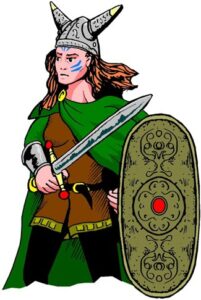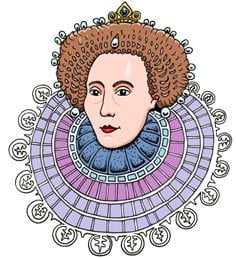
Yes, throughout the 9th and 10th centuries BC.
Despite the dangers, between 20,000 and 35,000 Danish Vikings chose to uproot and migrate to England between the 9th and 10th century.
They started as raiding parties seeing what they could take, but as their raids continued, more and more of them decided to stay, they liked England!
It begs the question, why did the Vikings leave the fiords of Scandinavia and settle here?
Well, it appears that the reason is the same as why today all those migrants are taking to small boats and pontoons to cross the English Channel. England offered a better life, the difference with the Vikings was that they came to conquer.
This meant that in 1013 Viking king Sweyn Forkbeard conquered England, only he died a year later. Then his son, the famous King Canute, came back and retook the country. His great empire was called The North Sea Empire which was sometimes describe as the Anglo-Scandinavian Empire. It was for most of the time made up of the kingdoms of England, Denmark and Norway. However, it didn’t last for long as it was a  .
.
What is a “thalassocracy”?
It is a maritime empire, a state with mainly sea bordering territories, basically a seaborne empire. Traditional thalassocracies seldom last long as they don’t dominate the interior, as they become connected by and then dependent upon the sea.
In fact, king Sweyn Forkbeard had been king of Denmark since 986 and then Norway from 1000 and went on to conquer England in 1013. Then, unfortunately, he died in the following year, and his realm was divided. His son, Canute the Great, acquired England in 1016, then moved on to take Denmark in 1018 and Norway in 1028.
He also didn’t last very long and died in 1035 and, again, his realm was divided. Interestingly when he ruled all three kingdoms in his great Empire he was, after the Holy Roman Emperor, the most powerful ruler in western Europe.
His son, Harthacnut, inherited England in 1040 and ruled it until his death in 1042.
Now it gets complicated.
- Harthacnut, his son, struggled to retain his father’s possessions.
- This meant Magnus, who was the illegitimate son of King Olaf II of Norway, went to Norway in 1035 and was crowned king at the age of 11.
- In 1042, Magnus was also crowned king of Denmark.
- Magnus ruled the two countries until 1047 when he died under weird circumstances.
- Magnus also became King of England in 1040 after the death of his half-brother Harold Harefoot, king of England.
- Harthacnut himself died suddenly in 1042.
- Edward the Confessor then followed and became king.
This meant that Harthacnut was the last Dane to rule England.
Then 24 year later William the Conqueror landed, a Frenchman of Viking descent invaded and became King.
So the answer to the question is yes, and it could be said they still do, an interesting discussion point.
Isn’t History Fun?
Ten questions to discuss:
- Why did Danish Vikings migrate to England during the 9th and 10th centuries despite the risks involved?
- What were the initial intentions of Danish Viking raiding parties in England, and how did their objectives evolve over time?
- What factors contributed to the establishment of Viking settlements in England rather than just temporary raiding camps?
- How did Sweyn Forkbeard’s conquest of England in 1013 contribute to the formation of the North Sea Empire?
- What characterized the North Sea Empire, and why did it ultimately falter?
- Define the term “thalassocracy” and explain how it applies to the Viking expansion into England.
- How did Sweyn Forkbeard’s reign demonstrate the interconnectedness of the Scandinavian kingdoms of Denmark, Norway, and England?
- What challenges did Canute the Great face in maintaining control over the vast territories of the North Sea Empire?
- Describe the succession struggles that occurred within the Viking rulership of England following Canute the Great’s death.
- How did the Norman Conquest in 1066 mark the end of Danish Viking rule in England, and what were the implications for the country’s future?
More points of contact to learn more.
https://thevikingherald.com/article/what-was-the-north-sea-empire/157
https://www.heritage-history.com/index.php?c=read&author=macgregor&book=vikings&story=magnus
©Tony Dalton
From SS Royal William to SS Britannia
Did you know that Samuel Cunard, the founder of the Cunard Steamship Company, in 1833 part owned the first ship to cross the Atlantic entirely

Queen Boudica
A wronged Queen, who very nearly defeated the might of Imperial Rome Boudica (also written as Boadicea) was a Celtic queen who led a revolt

Elizabeth I – The Virgin Queen
Queen Elizabeth I was Queen of England and Ireland from the 17th of November 1558 until her death on the 24th March 1603. Although a

Why Assassinate Abraham Lincoln?
President Abraham Lincoln, the16th president of the United States of America was assassinated on April 14th 1865. But why? What had this ‘man of the

The Act of Supremacy
On the 3rd November 1534 the first Act of Supremacy was passed? The Act of Supremacy This was the act that made Henry VIII the
Did an Italian Columbus discover America for Spain!
We do know that on October 16th 1492 Christopher Columbus’ fleet anchored at “Fernandina” He, an Italian, thought he had reached America! But, in fact,

